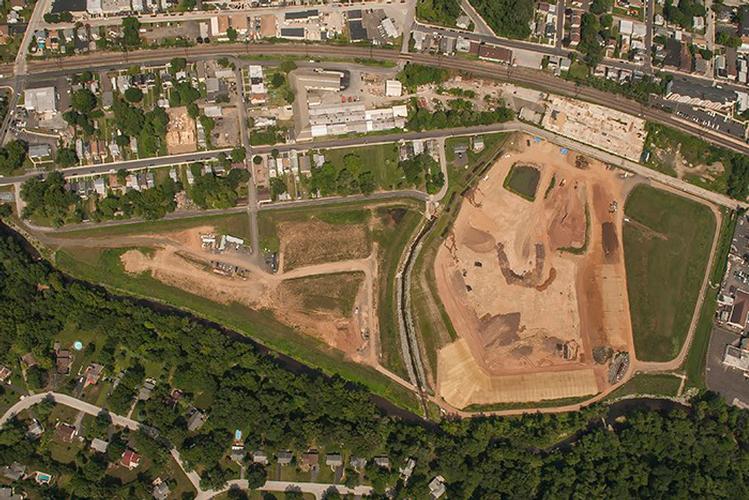When President Donald Trump proposed a massive 30 percent cut to the Environmental Protection Agency’s 2018 budget earlier this year, environmental supporters across the United States were stunned. Many of the agency’s programs and employees are on the chopping block, while projects the EPA normally provides funding for may be left withering on the vine because of a lack of state funds.
In Pennsylvania, the Department of Environmental Protection is operating with a fiscal budget about 40 percent lower than it was fifteen years ago. As the state cut its own funding, federal dollars increased to help close the gap. But what happens if the proposed cuts are approved and the money dries up? For the state’s Superfund sites, it means projects currently included on the EPA’s National Priorities List (NPL) will be delayed, continuing to pose health risks for the communities they’re in.

In this aerial photo of the BoRit Asbestos site provided to the EPA by Salvatore A. Boccuti, there are three parcels contaminated by asbestos, including a former playground. (Source: EPA.)
There are dozens of Superfund sites listed on Pennsylvania’s NPL. One of those sites listed is the Ryeland Road Arsenic Site, where lead, arsenic and other toxic chemicals contaminated soil and groundwater. Lead has long been known to cause developmental issues in children, while arsenic is capable of causing skin and lung cancers. BoRit Asbestos, another site on the list, is potentially exposing nearby residents to airborne fibers and putting them at risk of developing asbestosis or mesothelioma.
Trump’s proposed cuts to the EPA’s budget for 2018 include an estimated $332 million cut to Superfund administrative costs, which will slow already burdened and understaffed projects to a crawl. Without additional funding, states like Pennsylvania will have to find ways to close the funding gap, though in many cash-strapped areas taxpayers are already being pushed to cover other state programs.
What to Do?
The Superfund program has been in place for nearly four decades, and in that time has helped clean up toxic sites across the country. Cutting funding to the program and to the Environmental Protection Agency as a whole is shortsighted and wrong. By continuing to turn a blind eye to the environment, we put ourselves at risk of being unintentionally exposed to chemicals and toxins that were left behind decades ago.
According to a recent poll by Politico and the Harvard T.H. Chan School of Public Health, a majority of Americans are against cuts to the EPA. What many people don’t realize is that the multitude of regulations the agency has in place to protect the air, water and land are there for a reason. It’s not to bury us in red tape or dictate how we should live our lives; they’re merely meant to keep us healthy and safe while trying to clean up and remediate some of our past mistakes.
Trump’s proposal of such steep cuts to the EPA is a dangerous rebuke to all of the good things the agency has done over the years. It puts the health and safety of Americans at odds with the government’s push for economic growth and that’s a decision no one should have to make.
While the EPA avoided a major bullet in the budget slated to run through the end of the fiscal year in September, Congress is gearing up to discuss the 2018 budget. For now, everyone needs to continue making their voices heard and fight against cuts that don’t just hurt Pennsylvanians, but everyone.
Charles MacGregor is a health advocate with the Mesothelioma Cancer Alliance. His goals are to educate others and raise awareness about mesothelioma and push for a final ban of asbestos in the United States. When he isn’t working, Charles is an avid fan of baseball and the outdoors.